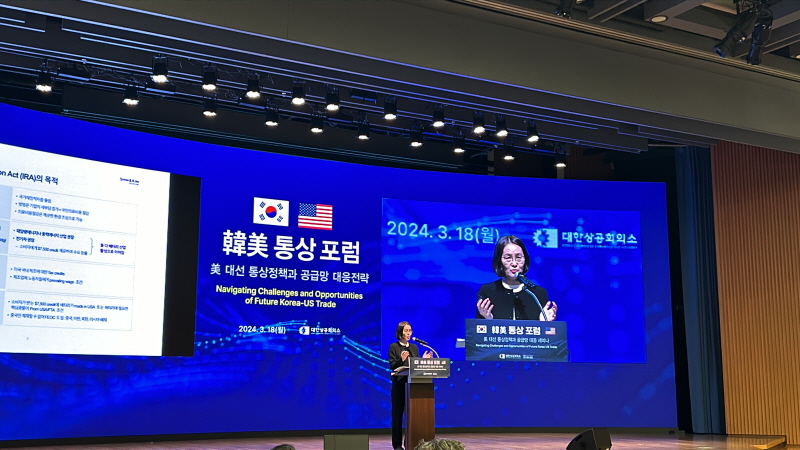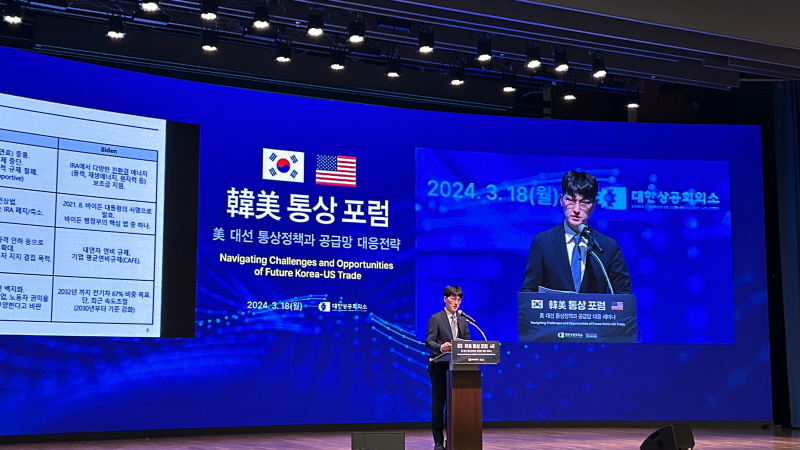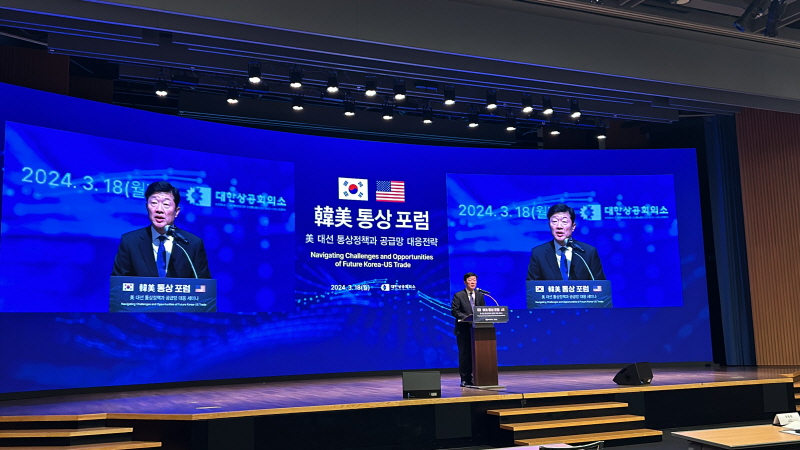트럼프 전 대통령이 이번 미국 대선에서 승리하더라도 IRA가 즉각 폐지될 가능성은 매우 낮으나, 전기차 전환 추세가 다소 늦어질 수는 있다는 전문가들의 공통된 의견이 제기됐다.

▲법무법인 세종 김선영 변호사
IRA 폐지는 불가…전기차 구매 시 7,500달러 지급 조항 무효화는 가능
친환경 산업 전환서 발생하는 실업률·배터리 핵심광물 중국 의존도 견제
트럼프 전 대통령이 이번 미국 대선에서 승리하더라도 IRA가 즉각 폐지될 가능성은 매우 낮으나, 전기차 전환 추세가 다소 늦어질 수는 있다는 전문가들의 공통된 의견이 제기됐다.
또한 이날 발표자들은 현 대통령인 바이든, 트럼프 후보 두 명 중 한 사람이 차기 대통령으로 당선될 것으로 예상되는 가운데 두 사람의 정책 기조가 중국 견제를 제외한 많은 방면에서 대척점을 이루고 있어 이에 대응할 수 있는 시나리오를 마련하는 것이 매우 중요하다는 데 입을 모았다.
대한상공회의소(이하 대한상의)는 미국 대선 후보별 통상정책 공약을 비교하고, 새로운 공급망 대응전략을 모색하기 위해 ‘韓美통상포럼: 美 대선 통상정책과 공급망 대응전략’을 18일 대한상공회의소 국제회의장에서 개최했다.
법무법인 세종의 김선영 변호사는 이날 ‘IRA 전망과 한국 배터리 산업의 대응 방안’에 대해 발표하며 트럼프가 대통령으로 당선되더라도 IRA(Inflation Reduction Act) 자체를 무효화하는 것은 불가능하나, 7,500달러의 구매 보조금을 지급하는 조항 삭제는 가능하다고 전했다.
IRA 폐지를 위해서는 국회 통과, 공청회, 논의 등 수많은 절차를 거쳐야 하며, 트럼프가 이를 모두 진행하지는 않을 것이라는 것이 김선영 변호사 포함 이날 발표자들의 공통된 의견이다.
김선영 변호사는 트럼프는 IRA 자체 폐지 대신 Selective Repeal(선택적 폐지)을 통해 조항 하나를 없애거나 바꾸는 형태로 소비자에게 7,500달러를 지급하는 조항을 무효화시킬 수 있다고 전했다.
이외에도 행정명령, 새로운 레귤레이션의 승인을 거절할 수 있는 CRA(Congressional Review Act), 기관장 교체 등 방법은 다양하다.
트럼프는 대통령 임기 당시 공개적으로 친환경 정책을 일관되게 공격했으며, 오바마 전 대통령이 만든 친환경법들을 뒤집으려 부단히 노력했었다.
트럼프는 환경 관련 77개 조항을 철폐(Deregulatory)하려 했으나 민주당의 거센 반대로 법원에서 공방을 벌였고, 실제로 철폐된 조항은 40개를 넘지 않았다.
이번 대선 공약으로 트럼프는 여전히 전기차 관련 보조금 철폐를 공언하고 있으므로 여러 방법으로 이를 시도할 것으로 보이나, 전세계적인 전기차 전환 추세를 트럼프 대통령 혼자 막기는 불가능하며, 미국 자동차 산업에도 혼동을 줄 수 있기에 타협할 가능성이 상당히 높다는 것이 김선영 변호사의 주장이다.
다만 트럼프의 반친환경적 정책 시도 자체는 우리나라 배터리와 전기차 업계에 리스크로 작용할 수 있어, 미국 자동차 기업들의 행보를 팔로우하며, 연대하는 것이 중요할 것이라고 전했다.
이어 발표자로 나선 법무법인 율촌의 박주현 변호사는 ‘환경정책과 전기차 업계의 대응 전략’에 대해 발표하며 트럼프 후보가 견제하는 것은 전기차 자체가 아닌 친환경적 산업 전환 과정에서 필연적으로 발생하는 실업률과 초기 비용, 배터리 핵심광물의 중국 의존도라고 전했다.
 ▲
▲법무법인 율촌 박주현 변호사
위와 같은 트럼프 후보의 정책 방향성은 아젠다 47(Agenda 47)에서 볼 수 있다.
아젠다 47에는 △미국 내 에너지 생산을 증대하여 단가를 줄이겠다 △바이든 행정부의 전기차 정책의 속도를 줄이겠다는 내용이 담겨 있다.
트럼프는 친환경 정책을 비시장적이고, 많은 비용을 소모한다는 주장으로 화석 연료의 사용을 중흥시키는 등 바이든의 그린 뉴딜 정책을 정면으로 맞받아치겠다는 공약을 내세우고 있다.
이는 중국을 견제한다는 의미와 더불어 전통적인 자동차 산업을 되살리겠다는 의미로 풀이되며 노동 조합들의 지지를 얻고 있다.
박주현 변호사는 트럼프 후보 진영의 에너지 정책 핵심은 ‘에너지 단가의 저감’이라고 강조했다.
에너지 공급 단가의 저감으로 값싸게 공장을 공장을 돌릴 수 있게끔 하여 취업 증가, 제품 생산성 향상 등을 이루고 중산층을 확보하여 미국 경제를 다시 금빛으로 물들이겠다는 목표다.
박주현 변호사는 트럼프 후보가 당선될 경우 현재 판매 증가 추이가 뚜렷한 하이브리드 자동차의 공급 확대를 준비하는 것이 충격을 완화할 수 있는 방법이 될 수 있으며 전기차에 우호적인 유럽과 같은 지역으로의 판로를 다양화하는 것도 대안이 될 수 있다고 전했다.
한편 우태희 대한상공회의소 상근부회장은 개회사에서 “11월에 치러지는 미국 대선에 기업과 경제인들이 많은 관심이 있을 것이라 생각한다”며 “지난해 해외 투자 728억달러 중 대미 투자가 300억달러를 차지하는 만큼 대미 투자의 중요성은 매우 크기에, 시나리오별 대응 전략을 마련하는 것이 중요하다”고 전했다.
 ▲
▲우태희 대한상공회의소 상근부회장
우리나라가 이번 미국 대선 결과에 민감하게 반응할 것 중 하나는 전기차다.
IRA와 전기차 배터리의 연결성과 트럼프 전 대통령이 2024년 대선에서 승리할 경우 어떠한 영향이 있을지에 대해 발표했다.
IRA는 Inflation Reduction Act의 약자로 IRA의 목적은 말 그대로 인플레이션 감축이며, 또 다른 한 가지는 중국 견제다.
인플레이션을 줄이기 위해서는 세금을 더 거두어 들이거나, 혹은 지출을 줄이는 것이다.
미국은 지출을 줄이는 방법으로 국민 의료 비용을 절감을 띄웠고, 이를 실행할 수 있는 방안으로 깨끗한 환경 조성을 위한 온실가스 감축(2030년까지 40% 이상 감소 목표 설정)을 택했다.
이는 전기차 보급 확대를 불러일으켰고, 배터리 산업의 활성화로 이어진다.
IRA는 전기차 배터리를 미국에서 제조해야만 보조금을 지급한다는 조항으로 배터리 제조 기업들을 미국으로 끌어들였으며, 배터리 제조에 들어가는 핵심광물과 부품 또한 중국산인지를 명시해야 한다는 조항으로 강도 높은 중국 견제 통상책으로 자리매김했다.
중국은 리튬, 코발트, 흑연 등의 원료 가공, 배터리 셀 등에서 50% 이상을 점유하고 있는데, 2040년 미국 내 전기차 960만대 판매가 전망되고 있어 위 부문들을 미국 내로 끌어들여 중국의 배를 더 이상 불려주지 않을 것이라는 것이 IRA의 목표다.
우리나라를 포함한 국가들이 IRA에 대응하기 위해 공장을 세우는 등 상당히 많은 예산을 투입했으나 Made in USA 배터리 조건 때문에 미국 내 생산이 원활하지만은 않다.
미국에서 생산되는 배터리 재료의 가격과 인건비가 매우 높으며 미국 부품 제조업체들이 수요를 따라가지 못해 시간 또한 오래 걸려 총 비용만 계속 상승하는 결과를 낳아 제조를 중단하는 기업들이 발생하고 있다.
박정현 법무법인 광장 변호사는 이날 발표에서 트럼프 전 대통령의 당선부터 이어진 여러 상황들이 미국의 경제 안보 정책이 강화되는 배경으로 작용했다고 전했다.
도널드 트럼프 전 대통령이 당선되며 ‘경제 안보가 국가 안보’라는 표현 아래 미국 경제 통상 및 산업 정책에 있어 경제 안보의 중요성이 부각되기 시작했다.
이후 코로나 팬데믹을 겪으며 글로벌 공급망에 있어 상호 의존성이 상당히 높다는 위험성이 떠오르며 무기화될 수 있다는 문제점도 나타났다.
이어 러시아의 우크라이나 침공으로 시작된 전쟁과 가자지구 사태와 같은 지정학적 위기가 발생하며 국가 안보적 관점에서 보았을 때 경제적 효율성보다 공급망의 안전성의 중요성이 더 중요하다는 인식이 자리잡았다.
미국의 경제 안보 조치는 당초의 수입 규제나 수출 통제와 같은 개별적인 정책 수단의 모습을 띄었었으나 점차 공급망 재편 또 산업 정책 등과 같은 보다 큰 틀에서의 접근으로 진화하고 있다.
바이든 정부가 들어서면서 점차 반도체, AI 등 첨단 기술 관련된 미국 중심의 공급망 재편을 위한 보조금 등과 같은 산업 정책 그리고 기술 유출 방지를 위해 투자 제한을 강화하는 등의 경제 행보 조치를 중심으로 이루어지고 있다.
이와 같은 조치들을 통해서 미국이 달성하려는 경제 안보의 목적은 초강대국으로서 기술 격차를 벌리고 경제 및 국방 등의 공력을 압도적인 우위를 공고히 하려는 것으로 분석된다.
박정현 변호사는 “중국과 관련해서는 11월 대선 결과에 상관없이 견제 기조는 유지되거나 더욱 강화될 가능성이 높다”며 “중국에 필드가 있거나 아니면 중국으로부터 원료를 수급하시는 경우에 직접적인 영향을 받을 수 있기 때문에 대중국 경제 안보 조치가 증가할 가능성에 대비를 해야 할 것”이라 강조했다.
이어 “반면에 중국과 경쟁 관계에 있는 경우에는 어느 정도 기회 요인으로 작용할 수도 있기 때문에 그러한 기회를 활용해서 경쟁력을 더 확보할 수 있는 방안을 적극 모색해야 한다”고 전했다.